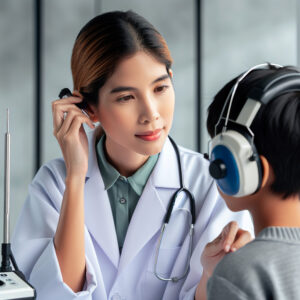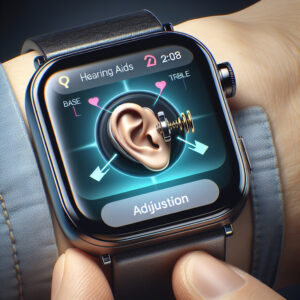Cleft Palate Hearing Loss: Diagnosis and Treatment Options
Understanding Cleft Palate Hearing Loss What is Cleft Palate? A cleft palate is a congenital deformity occurring when the roof of the mouth (palate) does not fully form during pregnancy. This results in an opening or gap in the palate. Cleft palates can affect both the hard and soft parts of the mouth, leading to… Read More
Top 5 Common Causes of Induced Hearing Loss
Introduction to Induced Hearing Loss Definition of Induced Hearing Loss Induced hearing loss refers to the reduction or loss of hearing ability due to external factors, rather than genetic or congenital causes. It can result from a variety of environmental, medicinal, or traumatic influences. Understanding the causes of induced hearing loss is essential for prevention,… Read More
How Ciprofloxacin Can Cause Hearing Loss and What to Do
Introduction to Ciprofloxacin and Hearing Loss Overview of Ciprofloxacin Ciprofloxacin is a widely used antibiotic belonging to the fluoroquinolone class. This medication is effective in treating a variety of bacterial infections by inhibiting the growth and multiplication of bacteria. It is commonly prescribed for conditions like urinary tract infections, respiratory infections, and skin infections. Ciprofloxacin… Read More
Is Hearing Worse in One Ear a Sign of a Serious Condition?
Introduction to Hearing Worse in One Ear Hearing worse in one ear can be an unsettling experience. Often, people may not realize the severity of the issue until it starts significantly affecting daily life. This condition, where one ear hears less effectively than the other, can stem from various sources. While it might seem like… Read More
Shingles and Hearing Loss: What You Need to Know
Introduction to Shingles and Hearing Loss Shingles and hearing loss might seem unrelated at first glance, but there is a significant connection between the two. Shingles, also known as herpes zoster, is a viral infection caused by the reactivation of the varicella-zoster virus, the same virus responsible for chickenpox. Hearing loss, on the other hand,… Read More
Tinnitus Muffled Hearing: Symptoms, Diagnosis, and Remedies
Introduction to Tinnitus Muffled Hearing Tinnitus muffled hearing is a condition that combines the persistent sensation of ringing in the ears with the perception of sounds being muffled. This dual impact on hearing can significantly affect an individual’s quality of life. Understanding both tinnitus and muffled hearing separately can help to grasp the full picture… Read More
Ibuprofen Ototoxic Risks: A Comprehensive Guide
Introduction to Ibuprofen and Ototoxicity What is Ibuprofen? Ibuprofen is a commonly used nonsteroidal anti-inflammatory drug (NSAID) that helps alleviate pain, reduce inflammation, and lower fever. Available over-the-counter and by prescription, ibuprofen is widely used to treat a range of conditions such as headaches, muscle aches, arthritis, and minor injuries. Despite its popularity and effectiveness,… Read More
The Hidden Truth: Hearing Loss from Chemotherapy Underestimated by Doctors
Introduction to Hearing Loss from Chemotherapy Chemotherapy is a life-saving treatment for many cancer patients, but it comes with an array of side effects. One significant yet often overlooked complication is hearing loss. Medical professionals frequently underestimate the risk and prevalence of hearing loss resulting from chemotherapy. This oversight can have lasting consequences for patients,… Read More
Thyroid Hearing Loss: Diagnosis and Treatment Options
Introduction to Thyroid Hearing Loss Thyroid hearing loss is a condition where issues related to the thyroid gland adversely affect one’s hearing capabilities. This specific type of hearing loss can be quite challenging to diagnose and treat, but with the right knowledge and early intervention, individuals can manage their symptoms effectively. Understanding the connection between… Read More
Technology and 90 dB Hearing Loss: Innovations and Improvements
Introduction to 90 dB Hearing Loss Hearing loss is a condition that affects millions of people globally, with 90 dB hearing loss representing a severe degree of impairment. This level of hearing loss significantly impacts daily life, making it challenging to engage in conversations, enjoy music, or simply hear environmental sounds. The good news is… Read More
The Connection Between Aging and Sensory Presbycusis
Introduction to Sensory Presbycusis What is Sensory Presbycusis? Sensory presbycusis is a type of age-related hearing loss resulting from the gradual degeneration of sensory cells in the inner ear. This condition primarily affects older adults and is one of the most common causes of hearing impairment in people over the age of 65. As these… Read More
How to Prevent High Frequency Hearing Loss as You Age
Introduction to High Frequency Hearing Loss with Age High frequency hearing loss with age is a common issue that affects many individuals as they get older. This type of hearing loss primarily impacts the ability to hear higher-pitched sounds, such as women’s and children’s voices, or the chirping of birds. Understanding the nature of high… Read More
The Impact of Emotional Stress on Hearing Loss: What You Need to Know
Introduction to Emotional Stress and Hearing Loss Emotional stress and hearing loss are two critical health issues that, when intertwined, can significantly impact an individual’s overall well-being. Emotional stress refers to the mental strain and anxiety that arise from various life situations. Hearing loss, on the other hand, involves a partial or total inability to… Read More
Cochlear Disease: How It Affects Your Hearing and What You Can Do
Introduction to Cochlear Disease Cochlear disease is an umbrella term for various conditions that affect the cochlea, a spiral-shaped organ in the inner ear responsible for converting sound waves into nerve signals. These conditions can lead to hearing loss, tinnitus, and balance issues. Understanding cochlear disease is crucial for anyone experiencing hearing difficulties or those… Read More
Caring for a Loved One with Parkinsons: A Comprehensive Guide
Understanding Parkinson’s Disease What is Parkinson’s? Parkinson’s disease is a progressive neurological disorder that primarily affects movement. It occurs due to the gradual loss of dopamine-producing neurons in the brain. Dopamine is a chemical messenger that plays a crucial role in transmitting signals for smooth, coordinated muscle movements. As the disease progresses, individuals may experience… Read More
















